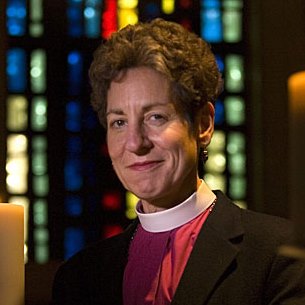Presiding Bishop Katharine Jefferts Schori preached September 22 at a service of Evening Prayer, held in the Tucker Hall on the Rikkyo University campus in Tokyo, as part of the 150th anniversary celebrations of the Nippon Sei Ko Kai, the Anglican Church in Japan.
The full text of the Presiding Bishop's sermon follows.
– – – – –
150th anniversary Nippon Sei Ko Kai, Tokyo
22 September 2009
Evening Prayer
Jer 31:8-9a; Ps 103:1-6; Matthew 5:1-10
We're here tonight to give thanks to God for 150 years of an Anglican presence in Japan. We are here as well to give thanks for the earliest province of the Anglican Communion which had not been part of the British Empire. I will begin by acknowledging, however, that the Nippon Sei Ko Kai owes its roots to American imperialism instead. Commodore Perry's insistence on a trade agreement in 1853-4 was soon followed by the entry of American missionaries who had been serving in China. God continues to work good out of things which did not begin in peace and holiness.
Fr. Channing Moore Williams, Fr. John Liggins, and Dr. Schmidt came directly from China, and soon began medical and educational mission efforts, including the institution that led to this university. It was some years before active evangelism became possible, but the history of the former Chinese missionaries here was of significant importance. The global mission work of Anglicans and others in the mid-19th century was beginning to shift toward a much less colonial and far more indigenized form.
Henry Venn and Rufus Anderson had begun to talk about indigenizing ministry at about the same time as these three Episcopal missionaries first came to Japan. The goal was to seed a church that could be self-supporting, self-governing, and self-propagating, and it was a way of being that became essential to the continuation of the church in Japan through the shifts in government policy in ensuing decades.
The ideal of a localized and autonomous church, able to evangelize from its own resources, facilitates the kind of vision that Jeremiah proclaims â people streaming from all directions and stations of life, God bringing together all families and nations into one whole. That is surely a vision yet to be fully realized, but the seeds sown here have begun to flourish and bear fruit. The vocation of the NSKK, like that of each part of Christ's body, is to work toward the reconciliation of all the world, and indeed, all creation, in an earthly image of the reign of God or the kingdom of heaven.
The passage from Matthew's gospel offers two very pointed hints for joining in this work. The first and the last of the beatitudes offer blessing that leads toward the kingdom of heaven, for the poor in spirit, and for those who are persecuted for the sake of justice and righteousness. Both of those qualities mark the NSKK and its mission.
The ability of this church to repent of its part in the violence of occupation and war has been a bold example to other Christians around the globe. The poor in spirit have no need for arrogance or defensiveness, but speak truth even when it is painful or shameful. That truth shares in the way, the truth, and the life, and begins to bring in the kingdom of heaven. The apology of this church had powerful consequences for the Anglican Church of Korea. The work of TOPIK (Towards Peace in Korea) would not be possible without the witness of the Japanese church.
The second blessing is for those who are persecuted for seeking justice. This church's advocacy for the Okinawan and Ainu people has not always been popular, but it has brought a measure of the heavenly kingdom in these islands. You and many others are blessed in that ministry.
The challenge this church faces today is like that of the last 150 years â how to be faithful, poor in spirit, and righteous in a culture that doesn't always share those values. Your ability to transform the society around you toward that vision of the heavenly kingdom lies in your ability to speak to this context, to live into those three selves of the 19th century missionaries (who learned them from the apostle Paul). This indigenizing church needs to speak good news in pachinko parlors, in anime, in the anonymity of crowded cities. This church has the ability to do that in this generation, as it has in generations past. Your witness can teach others as well â particularly the churches of Western Europe and North America who also labor in secular and consumerist cultures. What will you teach us? How will you help to propagate the gospel from seeds grown in the good earth of Nippon?
